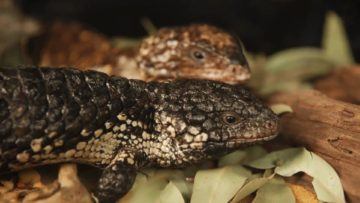Hannah Thomasy in The New York Times:
 Ned and Sunny stretch out together on the warm sand. He rests his head on her back, and every so often he might give her an affectionate nudge with his nose. The pair is quiet and, like many long-term couples, they seem perfectly content just to be in each other’s presence.
Ned and Sunny stretch out together on the warm sand. He rests his head on her back, and every so often he might give her an affectionate nudge with his nose. The pair is quiet and, like many long-term couples, they seem perfectly content just to be in each other’s presence.
The couple are monogamous, which is quite rare in the animal kingdom. But Sunny and Ned are a bit scalier that your typical lifelong mates — they are shingleback lizards that live at Melbourne Museum in Australia. In the wild, shinglebacks regularly form long-term bonds, returning to the same partner during mating season year after year. One lizard couple in a long-term study had been pairing up for 27 years and were still going strong when the study ended. In this way, the reptiles are more like some of the animal kingdom’s most famous long-term couplers, such as albatrosses, prairie voles and owl monkeys, and they confound expectations many people have about the personalities of lizards. “There’s more socially going on with reptiles than we give them credit for,” said Sean Doody, a conservation biologist at the University of South Florida.
More here.
